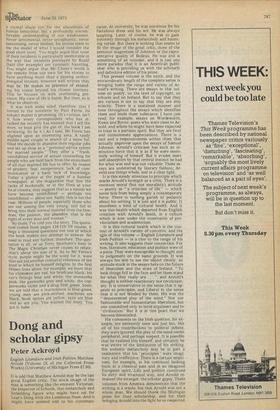Dong and scholar gipsy
Peter Ackroyd
English Literature and Irish Politics Matthew Arnold (Volume IX of the Collected Prose Works) (University of Michigan Press £7.50) It is odd that Matthew Arnold may be the last great English critic. The stock image of the man is something like the eminent Victorian, the Inspector of Schools, that melancholy and forbidding figure who might have sat for Lear's Dong with the Luminous Nose. And it might have seemed odd to his contempo raries. At university, he was notorious for his fastidious dress and his wit. He was always laughing. Later, of course, he was to gain notoriety through his melancholy and haunting verses. But there is nothing that seems to fit the image of the great critic, none of the personal magnetism of Johnson or the representative quality of Boileau. He was and is something of an outsider, and it is just one more paradox that it is an American publisher who is providing us with the scholarly and definitive edition of his prose.
This present volume is the ninth, and the extraordinary length of the complete series is bringing home the range and variety of Arnold's writing. There are essays in this volume on poetry, on the laws of copyright, on schools and on Ireland. But to say that they are various is not to say that they are also eclectic. There is a sustained manner and tone throughout the essays which identifies them and lends them substance. I have just read, for example, essays on Wordsworth, Keats and Byron: poets who were close to Arnold, and whom he might have been expected to treat in a partisan spirit. But they are final and consummate appreciations. There is a tact and a responsiveness within them that actually improves upon the essays of Samuel Johnson. Arnold's criticism has such an instinctive force that it is as if he were essentially writing of himself. But it evades mere self-absorption by that central instinct he had for what was and was not valuable. These essays are undeterred by literary fashion; Arnold saw things whole, and in a clear light.
It is this steady attention to principle which marks Arnold's strength as a critic. There is a constant moral (but not moralistic) attitude — poetry as " a criticism of life" — which saves him from being simply a contemporary force. There is nothing garish or pedantic about his writing. It is just and it is public. It manifests a kind of cultural health. And it was this health which departed from English criticism with Arnold's death, in a culture which is now under the constraints of provincialism and academicism.
It is this cultural health which is the context of Arnold's variety of concerns, and the title of this volume — English Literature and Irish Politics — is a clue to the range of his writing. It also suggests their connection. For him, literature, education and politics were of a piece. They were susceptible to thought and to judgement on the same grounds. It was always his aim to see the object clearly, an attitude stuck in the essays hereon the future of liberalism and the state of Ireland. "To look things full in the face and let them stand for what they really are . . . ", and Arnold's thought is neither reactionary nor revolutionary. It is conservative in the sense that it appeals to principles, and Liberal in the sense that it is not blinded by them. His was the "disinterested play of the mind." Not our fashionable and humanitarian liberalism, but one committed only to lucid argument and to 'civilisation.' But it is at this point that we become dissatisfied.
His comments on the Irish question, for example,• are eminently sane and just but, like all of his contributions to political debate, they were ignored. His play of the mind seems peripheral, and perhaps suspect. It is possible that he realised this himself, and certainly he was aware of the limitations of his writing. His endemic melancholy may be in part a realisation that his ' principles ' were imaginary and ineffective. There is a certain emptiness, for example, in his continual looking back at a classical past and at an imagined European spirit.".Life and politics continued its dirty and irrational way, and Arnold remained the stranger, the scholar gypsy. These volumes from America demonstrate that the writing is a whole, but that Arnold was not a whole man. We should thank the Michigan press for their scholarship, and for their bringing Arnold into the light he so respected.


































 Previous page
Previous page